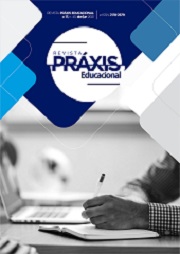Professor’s digital competences in pandemic times: Digcompedu self-assessment analysis
DOI:
https://doi.org/10.22481/praxisedu.v17i45.8336Keywords:
Digital Competences, COVID19, DigCompEduAbstract
The use of digital technologies in educational environments has been largely discussed in recent years, highlighting the need for adequate training so that its use can provide an effective improvement of educational processes and enhance student learning. When the Covid-19 pandemic forced educational institutions to close their physical doors, the research presented in this work was in progress and aimed to assess the level of digital skills of teachers at the Federal University of Bahia's Recôncavo (UFRB), based on the DigCompEdu self-assessment tool, validated by Dias-Trindade, Moreira and Nunes (2019), to subsequently organize adequate teacher training to meet the needs of the teaching staff of that institution. The pandemic, and the consequent need to invest in quality digital education, accelerated the project’s work, and the referred training was duly prepared and adapted to the needs arising from the continuity of distance education. The results of this study showed the weaknesses of the 182 respondent teachers, particularly in the area of learning assessment, leading to the teacher training preparation, already being implemented at UFRB.
Downloads
Metrics
References
BAUMAN, Zigmund. Modernidade líquida. Rio de Janeiro: Jorge Zahar Ed., 2001.
CARDOSO, Ariston de Lima; SANTO, Eniel do Espírito. Literacia digital: um mosaico de experiências no contexto da formação docente. In: DIAS-TRINDADE, Sara; MOREIRA, J. António; FERREIRA, António Gomes. Pedagogias digitais no ensino superior. Coimbra: CINEP/IPC, 2020.
CGI. Comitê Gestor da Internet. Centro Regional de Estudos para o Desenvolvimento para a Sociedade da Informação. TIC Domicílios 2019. São Paulo, 26 maio 2020. Disponível em: https://cetic.br/pesquisa/domicilios/indicadores/. Acesso em 22 set. 2020.
DIAS-TRINDADE, Sara; MOREIRA, José António. Avaliação das competências e fluência digitais de professores no ensino público médio e fundamental em Portugal. Revista Diálogo Educacional, Curitiba, v. 18, n. 58, p. 624-644, jul/set, 2018. Disponível em: https://periodicos. pucpr.br/index.php/dialogoeducacional/article/view/24187 Acesso em 15 ago. 2020.
DIAS-TRINDADE, Sara; FERREIRA, António Gomes. Digital teaching skills: DigCompEdu CheckIn as an evolution process from literacy to digital fluency, Icono 14 Revista Científica de Comunicación y Tecnologías Emergentes, Madri, v. 18, n. 2, p. 162-187, 2020. Disponível em: https://icono14.net/ojs/index.php/icono14/article/view/1519. Acesso em 20 set. 2020.
DIAS-TRINDADE, Sara; MOREIRA, José António; FERREIRA, António Gomes. Assessment of university teachers on their digital competences. QWERTY, Open and Interdisciplinary Journal of Technology, Culture and Education, v. 15, n. 1, p. 50-69, 2020. Disponível em http://www.ckbg.org/qwerty/index.php/qwerty/article/view/341/296 Acesso em 2 ago. 2020.
EUROPEAN PARLIAMENT AND COUNCIL. Recommendation of the European Parliament and the Council of 18 December 2006 on key competences for lifelong learning. Official Journal of the European Union, L394, 2006.
FERRARI, Anusca. Digital Competence in Practice: An Analysis of Frameworks. JRC Technical Reports. Luxembourg: Publications Office of the European Union, 2012.
FIGUEIREDO, António Dias. Por uma escola com futuro... para além do digital. Nova Ágora - Revista, n. 5, p. 19-21, set. 2016. Disponível em: https://www.researchgate.net/ publication/309124131/download. Acesso em: 25 set. 2020.
FROM, Jorgen. Pedagogical digital competence: between values, knowledge and skills. Higher Education Studies, Ontario, v. 7, n. 2, p. 43-50, 2017.
ILOMÄKI, Liisa; PAAVOLA, Sami; LAKKALA, Minna; KANTOSALO, Anna. Digital competence: an emergent boundary concept for policy and educational research. Education and Information Technologies, v. 21, n. 3, p. 655-679, 2016.
KOEHLER, Mattew J.; MISHRA, Punya.; CAIN, William. What Is Technological Pedagogical Content Knowledge (TPACK)? Journal of Education, v. 193, n. 3, p. 13-19, 2013. Disponível em: https://www.researchgate.net/publication/321505356_What_is_ Technological_Pedagogical_Content_Knowledge_TPACK. Acesso em: 20 set. 2020.
LE BOTERF, Guy. Construir as Competências Individuais e Colectivas. Porto: Asa, 2005.
THE NATIONAL Institute of Educational Technologies and Teacher Training (INTEF). Common Digital Competence Framework for Teachers. 2017. Disponível em: https://aprende.intef.es/sites/default/files/2018-05/2017_1024-Common-Digital-Competence-Framework-For-Teachers.pdf. Acesso em: 22 set. 2020.
ONU. Objetivos de Desenvolvimento Sustentável. Set. 2015. Disponível em: https://brasil.un.org/pt-br/sdgs. Acesso em: 20 set. 2020.
OTA, Marcos Andrei; DIAS-TRINDADE, Sara. Ambientes digitais de aprendizagem e competências digitais: conhecer o presente para agir num futuro pós-COVID. Revista Interfaces Científicas – Educação, Aracaju, v. 10, n. 1, p. 211-226, 2020. DOI: 10.17564/2316-3828.2020v10n1p211-226.
PRENSKY, Marc. Digital natives, digital immigrants. On the Horizon. MCB University Press, v. 5, n. 9, p. 1-6, 2001.
PRENSKY, Marc. From Digital natives to digital wisdom: hopeful essays for 21st century learning. Corwin Press, 2012. Disponível em https://www.doi.org/10.4135/9781483387765 Acesso em 10 jan. 2021.
RANIERI, Maria.; BRUNI, Isabella.; XIVRY, Anne-Claire Orban De Xivry. Teachers’ Professional Development on Digital and Media Literacy: Findings and recommendations from a European project. REM - Research on Education and Media. v. 10, n. 2, p. 10-19, 2017.
Downloads
Published
How to Cite
Issue
Section
License

This work is licensed under a Creative Commons Attribution-ShareAlike 4.0 International License.
You are free to:
Share - copy and redistribute the material in any medium or format; Adapt - remix, transform, and build from the material for any purpose, even commercially. This license is acceptable for Free Cultural Works. The licensor cannot revoke these freedoms as long as you follow the terms of the license.
Under the following terms:
Attribution - You must appropriately give credit, provide a link to the license, and indicate if any changes have been made. You may do so in any reasonable way, but not in a way that suggests that you or your use is endorsed by the licensor.
There are no additional restrictions - You cannot apply legal terms or technological measures that legally restrict others to make any use permitted by the license.










